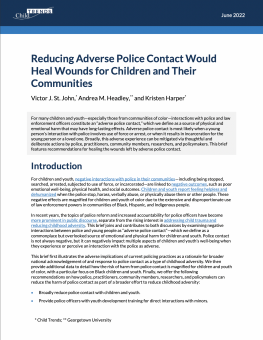
For many children and youth—especially those from communities of color—interactions with police and law enforcement officers constitute an “adverse police contact,” which we define as a source of physical and emotional harm that may have long-lasting effects. Adverse police contact is most likely when a young person’s interaction with police involves use of force or arrest, or when it results in incarceration for the young person or a loved one. Broadly, this adverse experience can be mitigated via thoughtful and deliberate actions by police, practitioners, community members, researchers, and policymakers. This brief features recommendations for healing the wounds left by adverse police contact. View the brief here.